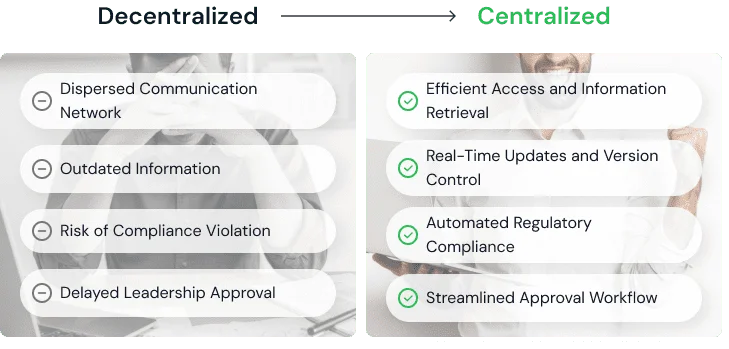Introduction
When you think about a property management company's job, what responsibilities come to mind first? You might think about collecting payments, enforcing community rules, finding and vetting new renters, or coordinating with any number of maintenance professionals. But a property manager's number-one responsibility—the one that makes all of these other roles possible—might not come to mind first and foremost.
That responsibility is communication.
This includes communication with internal teams, external vendors, residents, investors, and other key stakeholders.
Effective, efficient communication with all of these parties is paramount to running a successful property management company, maintaining your reputation, retaining top talent, and keeping the properties in your portfolio running like well-oiled machines.
However, for most property management companies, all that communication is decentralized, meaning maybe you talk with residents through one platform, investors through another, team members through a third…and of course everyone sends emails, text messages, and phone calls regardless of what platform they're “supposed” to be using. It also means different team members are likely crafting their own messaging to the stakeholders they communicate with—potentially sending inconsistent or outdated information because they can't put their fingers on the latest and greatest.
So, where does all this decentralized communication lead? Too many channels to check, important questions overlooked, mixed messaging eroding trust with tenants, team members, and investors alike, and a lot more trouble than it's worth.
In Property Management, Centralized Communication Makes All the Difference
The real estate mantra, location, location, location may technically be about the geographical location of a property, but it's just as applicable to a property manager's communication strategy. Scattered, disorganized communication channels are far less effective—they have far less curb appeal, if you will—than a single, centralized platform that acts as a hub for all communication needs.
Let's explore a couple of potential pitfalls of decentralized communication.
Imagine a team member has been asked to reach out to tenants about upcoming fire alarm testing, explaining the protocols for the day. In a decentralized communication system, he's got to dig through his emails to find the information he needs to share, but when he finds it, he's not sure if it's the latest version. He seems to remember an update coming through recently, but since he can't locate it, he goes ahead with the outdated information, inadvertently telling residents the wrong time for the testing.
Or let's say another team member is responsible for sending investors a community update. She's sent her text to leadership for approval but they haven't responded, and the update is due today. They're busy, she reasons, and she figures the content is probably fine, so she goes ahead and sends it. Unfortunately, she's forgotten to include some boilerplate legal language, meaning her communication doesn't comply with investor regulations and the company could face financial consequences.
Now, let's look at the same scenarios in a property management company with a centralized communication platform.
The first team member logs onto the platform and navigates quickly to the tenant communication hub, where he easily finds the information he needs on fire alarm testing. (The outdated information was deleted when the revised version was updated, so there's no doubt he's got the latest and greatest.) He copies and pastes what he needs into a message for tenants, who will receive the portal notifications and be able to make appropriate arrangements for testing day.
The second team member logs into the investor communication section of the platform, and when she opens up a new draft message, it's automatically populated with the regulatory language she needs to include. She adds the rest of the content and submits it for approval. Rather than being buried in her boss's inbox, the automated approval workflow sends a notification to her dashboard, so she can review the language and give her employee the thumbs-up in plenty of time for the update to go out to investors.

Are You Ready to Centralize Your Property Management Communication?
How much time does your team waste every day checking half a dozen different communication channels? What about looking for the latest messaging, or correcting erroneous communications? How about sifting through all the different social media platforms looking for reviews and engagement, when those communications could be automatically fed into a centralized portal? How does that translate to income loss or reputation damage?
By centralizing communication efforts, consolidating everything to one platform, and ensuring the latest critical information is easily accessible to every team member, your property management company can save time, money, and effort every single day. Then, you can use all those once-wasted resources to focus on what really matters: your residents.
Syberry is obsessed with helping our clients meet their business goals through custom software solutions, and for property managers, centralized communication is a critical one. When you're ready, get in touch with us to discuss your communication needs—and whether a custom communication hub is the right next step for your your organization.



